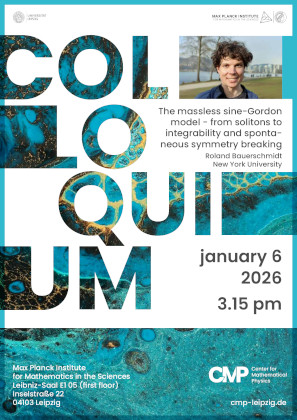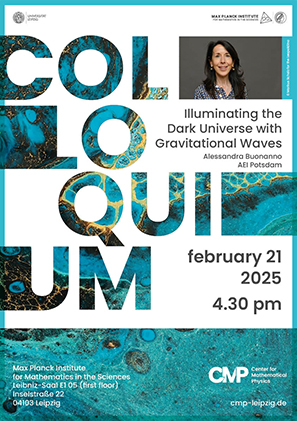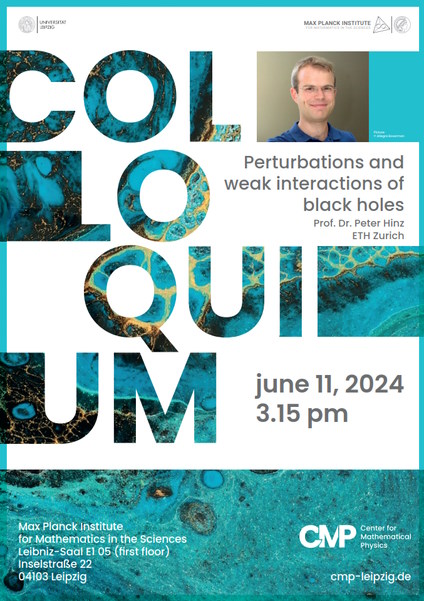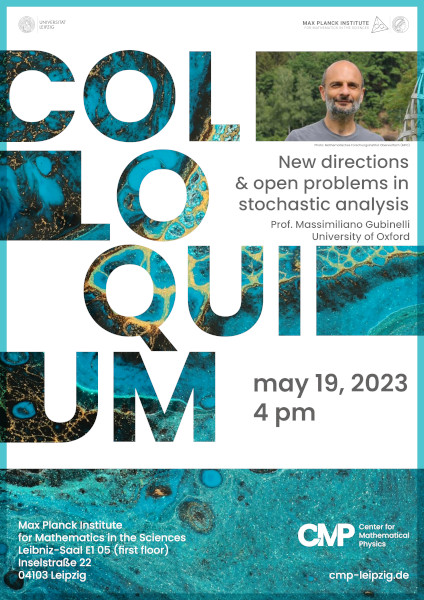If you want to keep informed about activities of the CMP please sign up in our mailing list
announcements-join@cmp-leipzig.de with the subject "subscribe".
Research Seminars
- HEP – QFT Seminar: Tuesdays at 15:15, ITP
- Physics Colloquium: Tuesdays at 16:30, main physics building
- Research Seminar ('Oberseminar') Analysis-Probability: Tuesdays 15:15 and 16.45 (irregularly), MPI for Mathematics in the Sciences
- Oberseminar Analysis: Thursdays at 15:15, Augusteum
- Emmy-Noether seminar: Thursdays at 15:00, ITP/online
- Webinar: Analysis, Quantum Fields, and Probability: Thursdays at 17:00 (irregularly), online
- Leipzig General Relativity seminar series: Fridays at 15:15, ITP
- Colloquium: Local Quantum Physics Crossroads: biannually, online
Center for Mathematical Physics Colloquium
Roland Bauerschmidt (NYU, Courant Institute, New York)
Title: The massless sine-Gordon model - from solitons to integrability and spontaneous symmetry breaking
Date: Tuesday, 06 January 2026 at 15:15
Location: Leibniz lecture hall, MPI for Mathematics in the Sciences
The massless sine-Gordon model is a central example in 2d
probabilistic quantum field theory. It is dual to the 2d Coulomb gas and
conjecturally features in various different contexts such as in the continuum
limits of height functions of near-critical dimer and 6-vertex models. This
colloquium starts with a brief overview of the probabilistic perspective on
quantum field theory and then explains various aspects in the instance of the
massless sine-Gordon model. This includes in particular a recent result with
Christian Webb (Helsinki) and Scott Mason (NYU) in which we prove the
conjecture that the fractional correlation functions of the sine-Gordon model
at the free fermion point are given by renormalized determinants of twisted
Dirac operators -- the tau functions of Sato-Miwa-Jimbo.

Center for Mathematical Physics Colloquium (former)
Alessandra Buonanno (MPI for Gravitational Physics (AEI), Potsdam)
Title: Illuminating the Dark Universe with Gravitational Waves
Date: Friday, 21 February 2025 at 16:30
Location: Leibniz lecture hall, MPI for Mathematics in the Sciences
For centuries, we have explored the Universe and discovered novel astrophysical sources and phenomena through the observation of electromagnetic waves. In 2015, we observed the first gravitational wave passing through the Earth produced by the merger of two black holes. Since then, a few hundred gravitational waves have been detected, including the gravitational signal produced by the coalescence of two neutron stars, accompanied by a plethora of electromagnetic counterparts observed around the world. In this talk, I will highlight the theoretical work underpinning these observations and review the main results in astrophysics, cosmology and fundamental physics. I will then discuss the discovery potential of future observatories in space and on the ground.

Peter Hinz (ETH Zürich)
Title: Perturbations and weak interactions of black holes
Date: Tuesday 11 June 2024 at 15:15
Location: Leibniz lecture hall, MPI for Mathematics in the Sciences
Following an introduction to general relativity, the Einstein field equations, and an overview of recent results on the stability of black holes, I will discuss work in progress towards the construction of singular perturbations of spacetimes via the insertion of small black holes. This aims to provide the first rigorous examples of spacetimes describing the merger of two black holes with extreme mass ratios.
Massimiliano Gubinelli (University of Oxford)
Title: New directions & open problems in stochastic analysis
Date: Friday 19 May 2023 at 16:00
Location: Leibniz lecture hall, MPI for Mathematics in the Sciences
Stochastic analysis makes precise the intuition that paths of Markov diffusions look like Brownian motion. The struggle for similar precision applied to a larger class of random fields led to the invention of controlled paths and regularity structures and opened the way to a new approach to Euclidean qua
ntum field theory. However, despite a lot of progress, it feels that we are still at the infancy of this rich field where analysis, geometry and algebra meet with probability theory in new ways. I will try to name few problems which I think are important to our deeper understanding of these connections
Other Colloquium (former)
Yasuyuki Kawahigashi (The University of Tokyo)
Title: Quantum symmetries in operator algebras and mathematical physics
Date: Wednesday, 26 March 2025 at 16:00
Location: University of Leipzig, Paulinum (Augustusplatz 10), Felix-Klein-Hörsaal (P501 P5.014)
A notion of symmetry has been fundamental in mathematics and physics for many years. A new type of "quantum" symmetry has emerged in theory of operator algebras, quantum groups, quantum invariants in low dimensional topology, integrable systems, vertex operator algebras, quantum field theory and condensed matter physics since 1980's. I will present development in these areas from an operator algebraic viewpoint. Emphasis is given to the Jones theory of subfactors, chiral conformal field theory and two-dimensional topological order. No knowledge on these topics is assumed as a prerequisite.
Daniel Baumann (University of Amsterdam)
Title: Positive geometry in cosmology
Date: Tuesday 13 Feb 2024 at 16:30
Location: University of Leipzig (Theory Lecture Hall, Linnestr. 5, 04103 Leipzig)
Cosmology is famously an observational rather than an experimental science. No experimentalists were present in the early universe, and the birth and subsequent evolution of the universe cannot be repeated. Instead, we can only measure the spatial correlations between cosmological structures at late times. A central challenge of modern cosmology is to construct a consistent "history" of the universe that explains these correlations.
Recently, a new bootstrap approach was developed to understand this history using physical consistency conditions alone. In this colloquium, I will explain the basic idea behind this "cosmological bootstrap". I will also describe the search for new geometrical structures, called "positive geometries", which may underlie the theory of cosmological correlations. Finding such structures is one of the central aims of the ERC Synergy Grant project UNIVERSE+. I hope to make the talk accessible to a broad audience, and will not assume any background in cosmology or particle physics.
Workshops
Workshops (former)
Lectures
Lectures (former)





